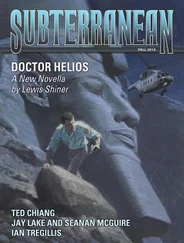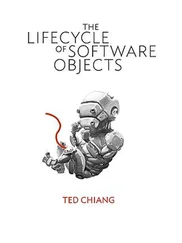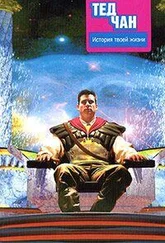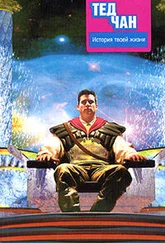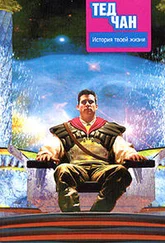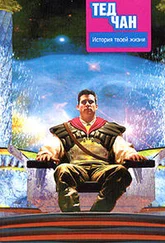I don’t claim that this will be an easy path. I have nothing to offer the McCulloughs except my hope that they will be able to make sense of their lives despite the absence of their son. But our lives have often been difficult even when we believed there was a divine plan, and we’ve persevered. If we have only ever been on our own, then our successes in spite of that are proof of our capabilities.
So I will return to the Arisona dig, Lord, whether it is under your watchful eye or not. Even if humanity is not the reason for which the universe was made, I still wish to understand the way it operates. We human beings may not be the answer to the question why, but I will keep looking for the answer to how.
This search is my purpose; not because you chose it for me, Lord, but because I chose it for myself.
Amen.
Anxiety Is the Dizziness of Freedom

Nat could have used a cigarette, but company policy forbade smoking in the store, so all she could do was get more and more nervous. Now it was a quarter to four, and Morrow still hadn’t returned. She wasn’t sure how she’d explain things if he didn’t get back in time. She sent him a text asking where he was.
A chime sounded as the front door opened, but it wasn’t Morrow. A guy with an orange sweater came in. “Hello? I have a prism to sell?”
Nat put her phone away. “Let’s take a look at it.”
He came over and put the prism on the counter; it was a new model, the size of a briefcase. Nat slid it around so she could see the numeric readout at one end: the activation date was only six months ago, and more than 90 percent of its pad was still available. She unfolded the keyboard to reveal the display screen, tapped the ONLINE button, and then waited. A minute went by.
“He might have run into some traffic,” said Orange Sweater uncertainly.
“It’s fine,” said Nat.
After another minute the ready light came on. Nat typed
Keyboard test.
A few seconds later a reply came back:
Looks good.
She switched to video mode, and the text on the screen was replaced by a grainy image of her own face looking back at her.
Her parallel self nodded at her and said, “Mic test.”
“Loud and clear,” she replied.
The screen reverted to text. Nat hadn’t recognized the necklace her paraself had been wearing; if they wound up buying the prism, she’d have to ask her where she got it. She looked back at the guy with the orange sweater and quoted him a price.
His disappointment was obvious. “Is that all?”
“That’s what it’s worth.”
“I thought these things got more valuable over time.”
“They do, but not right away. If this was five years old, we’d be having a different conversation.”
“What about if the other branch has something really interesting going on?”
“Yeah, that’d be worth something.” Nat pointed at his prism. “ Does the other branch have something interesting going on?”
“I…don’t know.”
“You’ll have to do the research yourself and bring it to us if you want a better offer.”
Orange Sweater hesitated.
“If you want to think it over and come back later, we’re always here.”
“Can you give me a minute?”
“Take your time.”
Orange Sweater got on the keyboard and had a brief typed exchange with his paraself. When he was done, he said, “Thanks, we’ll be back later.” He folded the prism up and left.
The last customer in the store had finished chatting and was ready to check out. Nat went to the carrel he’d been using, checked the data usage on the prism, and carried it back to the storeroom. By the time she had finished ringing him up, the three customers with four o’clock appointments had arrived, including the one who needed the prism Morrow had with him.
“Just a minute,” she told them, “and I’ll get you checked in.” She went to the storeroom and brought out the prisms for the two other customers. She had just set them up in their carrels when Morrow came through the front door, elbows splayed as he carried a big cardboard carton. She met him at the counter.
“You’re cutting it close,” she whispered, glaring at him.
“Yeah, yeah, I know the schedule.”
Morrow took the oversize box into the storeroom and came out with the prism. He set it up in a carrel for the third customer with seconds to spare. At four o’clock, the ready lights on all three prisms came on, and all three customers began chatting with their paraselves.
Nat followed Morrow into the office behind the front counter. He took a seat at the desk as if nothing had happened. “Well?” she asked. “What took you so long?”
“I was talking to one of the aides at the home.” Morrow had just come back from seeing one of their customers. Jessica Oehlsen was a widow in her seventies with few friends and whose only son was more of a burden than a comfort. Almost a year ago she’d started coming in once a week to talk with her paraself; she always reserved one of the private booths so she could use voice chat. A couple months ago she had fractured her hip in a bad fall, and now she was in a nursing home. Since she couldn’t come to the store, Morrow brought the prism to her every week so she could continue her regular conversations; it was a violation of SelfTalk’s company policy, but she paid him for the favor. “He filled me in about Mrs. Oehlsen’s condition.”
“What about it?”
“She’s got pneumonia now,” said Morrow. “He said it happens a lot after a broken hip.”
“Really? How does a broken hip lead to pneumonia?”
“According to this guy, it’s because they don’t move around a lot and they’re zonked on oxy, so they never take a deep breath. Anyway, Mrs. Oehlsen’s definitely got it.”
“Is it serious?”
“The aide thinks she’ll be dead within a month, two tops.”
“Wow. That’s too bad.”
“Yeah.” Morrow scratched his chin with his blunt, square fingertips. “But it gave me an idea.”
That was no surprise. “So what is it this time?”
“I won’t need you on this one. I can handle it by myself.”
“Fine by me. I’ve got enough to do.”
“Right, you’ve got a meeting to go to tonight. How’s that going?”
Nat shrugged. “It’s hard to tell. I think I’m making progress.”
· · ·
Every prism—the name was a near acronym of the original designation, “Plaga interworld signaling mechanism”—had two LEDs, one red and one blue. When a prism was activated, a quantum measurement was performed inside the device, with two possible outcomes of equal probability: one outcome was indicated by the red LED lighting up, while the other was indicated by the blue one. From that moment forward, the prism allowed information transfer between two branches of the universal wave function. In colloquial terms, the prism created two newly divergent timelines, one in which the red LED lit up and one in which the blue one did, and it allowed communication between the two.
Information was exchanged using an array of ions, isolated in magnetic traps within the prism. When the prism was activated and the universal wave function split into two branches, these ions remained in a state of coherent superposition, balanced on a knife’s edge and accessible to either branch. Each ion could be used to send a single bit of information, a yes or a no, from one branch to the other. The act of reading that yes/no caused the ion to decohere, permanently knocking it off the knife’s edge and onto one side. To send another bit, you needed another ion. With an array of ions, you could transmit a string of bits that encoded text; with a long-enough array, you could send images, sound, even video.
Читать дальше




